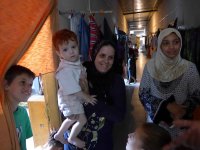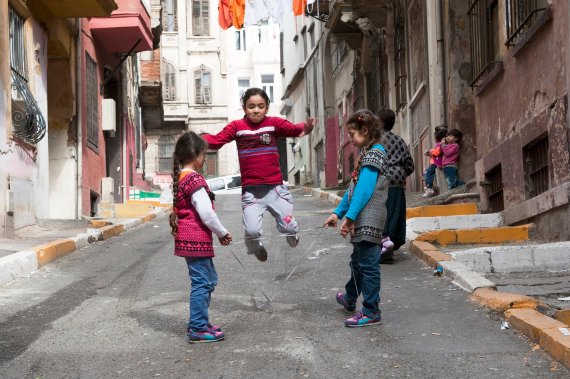Photos Thea Hilhorst and Hollandse Hoogte
Many Syrian refugees are trapped with nowhere to go, observes Thea Hilhorst after a visit to Lebanon, Jordan and Turkey. The latter two countries have closed their borders with Syria. ‘In the border zone between Syria and Jordan there are 50,000 refugees caught in a no-man’s-land. Every day relief workers drive into this border zone with goods, while the refugees are being shot at. It’s the same story in the border zone between Syria and Turkey. Only the border with Lebanon is porous.’
‘Treat refugees as normally as possible and help them to help themselves’
Hilhorst, currently part-time professor at Wageningen and Rotterdam, travelled around Syria’s neighbouring countries and Greece for three weeks. Last week the first UN world summit on humanitarian aid was held in Istanbul. Hilhorst wanted to get a picture of the refugee crisis in advance of the conference.
There are already more than 1.5 Syrian refugees in Lebanon, which has a population of 4.5 million. Hilhorst: ‘There are refugees everywhere, and there are Syrians working in all the cafes and restaurants. Lebanon doesn’t want any refugee camps officially but there are still Palestinian camps and a lot of Syrians end up there. The camp in Saida has grown from 70,000 to 110,000 people on an area of 1.1 square kilometres. There are 15 militias there that are at war with each other. According to my guide in the camp, you get a room there if you offer a son to the militia. He then goes off to fight in Syria or wage jihad in Europe. Refugees could bring in terrorism – we should realize that.’
Self-sufficiency
But the majority of refugees in Lebanon are not in camps. They are living in informal settlements on farmers’ land, where they set up a tent on a patch of ground and earn a bit of money in agriculture and horticulture. Or they club together to rent a house and look for black-market work. Most refugees are self-sufficient. Until they have used up their savings and hire a people-smuggler to get them to Europe. ‘The Lebanese economy was already based on the presence of refugees but tensions have arisen now because the Syrians are squeezing less educated Lebanese out of the job market.’
In Jordan and Turkey too, no more than 10 percent of the refugees are in big camps. Hilhorst visited a family in the Turkish city of Izmir. ‘Nine of them – two men, two women and five children – are living in two rooms. One of the men makes handbags and earns 500 dollars a month, half of which goes on rent. The other man has a slipped disc and needs looking after. They can’t quite make ends meet and they get some things from a relief organization that visits them regularly. It is often better not to live in a camp. But then the country should register its refugees so they get legal protection and can go to school and hospital.’
Registration
Hilhorst saw a new development in Lebanon. ‘Some of the refugees are given a kind of Visa card which they can only use in supermarkets to buy food. That card is paid for by the UN refugee organization UNHCR. This wouldn’t have been possible ten years ago, but it is now, thanks to technological innovation. Registration is a condition for this as well, to prevent refugees from signing up to get a card at four different places.’
The Visa card supports the system of small-scale provision for refugees, which Hilhorst sees as preferable to large-scale camps. ‘You see the same thing in the Netherlands. The large-scale accommodation leads to hassles and protest, while one house for refugees in a street is not a problem and leads to neighbours helping out. That’s what you see in Lebanon and Jordan too, where there are community centres where many refugees can come with their problems and get advice or be referred to the appropriate organizations.’
So Hilhorst’s recommendation is: ‘Treat refugees as normally as possible and help them to help themselves. That means good registration, legal protection, access to health care and education, and financial support. Sadly, this is lacking in more and more places at the moment.’
Humanitarian Summit

Thea Hilhorst attended the first Humanitarian Summit of the United Nations in Istanbul on 23 and 24 May. What she found most interesting was the consultation between the mayors of big cities in Europe. ‘You notice that they are far more open to providing well for refugees than their national governments are.’ She was also impressed by the consultations between the 15 largest donors, called the Grand Bargain. The 15 countries, which include the Netherlands, the US, Germany and France, agreed to give aid organizations longer contracts and to use at least 20 percent of the budget for local aid organizations. ‘They are often better and cheaper.’
One disappointment was that the UN was not willing to discuss its own role. ‘There is a lot of criticism of refugee policy. The UN controls the spending and does some of the implementation itself. Whereas what you really need is independent testing. This criticism was at the top of the declaration drawn up by aid organizations last year at the Dutch Humanitarian Summit. But it seems the UN isn’t keen to discuss its own performance.’

